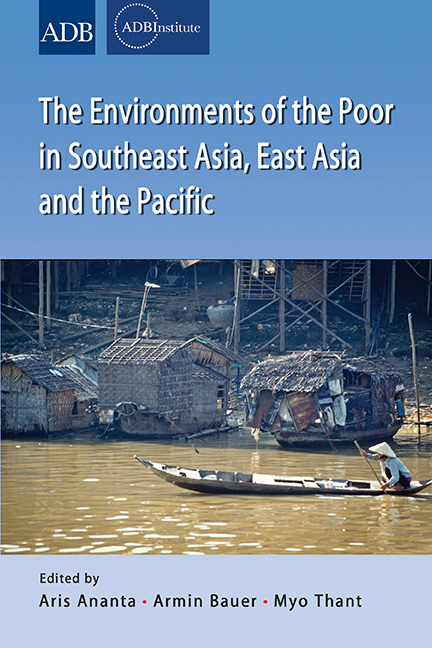Book contents
- Frontmatter
- Contents
- Preface
- List of Contributors
- Part I OVERVIEW
- Part II EAST ASIA (People's Republic of China and Republic of Korea)
- Part III PACIFIC ISLANDS
- Part IV MAINLAND SOUTHEAST ASIA (Cambodia, Thailand, Vietnam)
- 9 Poverty and the Environment in Rural Cambodia
- 10 Conservation Agriculture in Cambodia: A Triple-Win Option
- 11 Voices of the Poor on Climate Change in Thailand and Vietnam
- 12 Poor Thai Farmers' Adaptation to Climate Change
- Part V ARCHIPELAGIC SOUTHEAST ASIA (Indonesia, Malaysia, Philippines)
11 - Voices of the Poor on Climate Change in Thailand and Vietnam
from Part IV - MAINLAND SOUTHEAST ASIA (Cambodia, Thailand, Vietnam)
Published online by Cambridge University Press: 21 October 2015
- Frontmatter
- Contents
- Preface
- List of Contributors
- Part I OVERVIEW
- Part II EAST ASIA (People's Republic of China and Republic of Korea)
- Part III PACIFIC ISLANDS
- Part IV MAINLAND SOUTHEAST ASIA (Cambodia, Thailand, Vietnam)
- 9 Poverty and the Environment in Rural Cambodia
- 10 Conservation Agriculture in Cambodia: A Triple-Win Option
- 11 Voices of the Poor on Climate Change in Thailand and Vietnam
- 12 Poor Thai Farmers' Adaptation to Climate Change
- Part V ARCHIPELAGIC SOUTHEAST ASIA (Indonesia, Malaysia, Philippines)
Summary
The poverty headcount ratios of the emerging market economies of Thailand and Vietnam have declined impressively (World Bank 2008). However, the rural areas are still much poorer than their urban counterparts (Healy and Jitsuchon 2007). Furthermore, the environments in which the poor live make them more dependent on agricultural and natural resources. Hence, climate change is especially affecting the rural poor (Millennium Ecosystem Assessment 2005; Nguyen 2010). But little is known about how the poor perceive climate change or how it affects their livelihood. In general, vulnerability to poverty remains a major problem in emerging market economies such as Thailand and Vietnam, especially in the low-potential and poorer geographical areas, where infrastructure is weak and insurance and credit markets are often missing. For example, it was found in Thailand that agriculture in low- potential areas is often performed by the elderly, as part-time farmers who adjust their farm organization in response to the outmigration of younger household members (Gödecke and Waibel 2011). Such farmers are probably less inclined to adopt the sort of new agricultural technology that could reduce the negative effects of climate change.
In this essay we analyse the perceptions of the members of rural households in Vietnam and Thailand as expressed in a comprehensive set of panel data collected in 2007 and 2008 from some 4,400 households. We look at how rural households, especially the poor and vulnerable among them, experienced economic, environmental, and idiosyncratic and covariate shocks. We raise three questions that bear on the planning and implementation of interventions aimed at mitigating the negative consequences of climate change:
• How seriously do rural households take climate-related risks compared to other shocks endured in the recent past?
• How much of an effort do poor and vulnerable rural households make to reduce the impact of climate-related risks?
• Do poor people experience or perceive climate-related risk dif- ferently than the non-poor and do they act differently in coping with it?
- Type
- Chapter
- Information
- Publisher: ISEAS–Yusof Ishak InstitutePrint publication year: 2013

